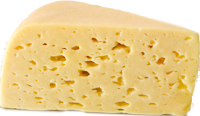There were no floodlights on the seaward side of the ship. Red cut his motor to half of nothing and curved in under the overhang of the stern, sidled up to the greasy plates as coyly as a clubman in a hotel lobby.
Double iron doors loomed high over us, forward a little from the slimy links of a chain cable. The speedboat scuffed the Montecito's ancient plates and the sea water slapped loosely at the bottom of the speedboat under our feet. The shadow of the big ex-cop rose over me. A coiled rope flicked against the dark, caught on something, and fell back into the boat. Red pulled it tight, made a turn around something on the engine cowling.
He said softly: "She rides as high as a steeplechaser. We gotta climb them plates."
I took the wheel and held the nose of the speedboat against the slippery hull, and Red reached for an iron ladder flat to the side of the ship, hauled himself up into the darkness, grunting, his big body braced at right angles, his sneakers slipping on the wet metal rungs.
After a while, something creaked up above and feeble yellow light trickled out into the foggy air. The outline of a heavy door showed, and Red's crouched head against the light.
I went up the ladder after him. It was hard work. It landed me panting in a sour, littered hold full of cases and barrels.Rats skittered out of sight in the dark corners. The big man put his lips to my ear: "From here we got an easy way to the boiler-room catwalk. They'll have steam up in one auxiliary, for hot water and the generators. That means one guy. I'll handle him. The crew doubles in brass upstairs. From the boiler room I'll show you a ventilator with no grating on it. Goes to the boat deck. Then it's all yours."
"You must have relatives on board," I said.
"Never you mind. A guy gets to know things when he's on the beach. Maybe I'm close to a bunch that's set to knock the tub over. Will you come back fast?"
— Raymond Chandler, "The Man Who Liked Dogs"
As with so many things, when framing this scene of his early detective Carmady sneaking aboard a "gambling boat" anchored out in Santa Monica Bay, Raymond Chandler was writing from life. There were a number of such "gambling boats" that sat anchored in international waters, off the coast of Southern California during the 1930s.
I was reminded of both this story and its basis in fact earlier this week, when I heard the sad news that fellow Sleuthsayer, the great Paul D. Marks had passed away. In addition to being one hell of a writer, Paul was quite the student of history, including a stated obsession with Southern California's historic gambling boats. And a few months back, he wrote one of his best Sleuthsayers posts about them.
So, in honor of Paul, in today's post I'm going to riff on his wonderful piece about the gambling boats by harkening back even further—to the 1920s—and a similar enterprise of questionable legality: Prohibition-era rum runners, and the so-called "Rum Row."
Background
In 1919 the U.S. Congress passed the Volstead Act, ratifying and enforcing the 18th amendment to the Constitution, and for the next fourteen years the production, importation and distribution of alcoholic beverages was against the law. Not until the act's repeal in 1933 would Americans be able to buy a drink legally again.
Of course, this meant big money was out there for the taking, as long as you didn't have any qualms about breaking the law. "Prohibition," as it quickly became known, helped bankroll a massive expansion of organized crime syndicates in both the United States and a host of other countries.
Why?
Simple. Turns out most Americans liked to have a drink every now and then. And since it wasn't illegal to drink or to possess alcohol you had "bought before Prohibition," flouting the Volstead Act turned into something of a national pastime.
 |
| Americans taking the 18th Amendment about as seriously as you'd expect them to. |
 |
| The Malahat |
According to author Jim Stone in My Dad, the Rum Runner, ships like the Malahat didn't have to be fast, and they didn't have much to fear from the likes of the Coast Guard. Unless there was criminal activity the Coast Guard left the rum rows alone in most of the spots where they congregated along the West Coast (The Farallon Islands, fifty miles off the Golden Gate, were supposedly a popular spot for the rum row ships to set up shop for months at a time). The speedboats, trawlers and other smaller craft used by local smugglers to load up at rum row were their preferred targets.
On a typical run south from her homeport in Vancouver, the Malahat would carry “200 cases of well-known brands of scotch whiskey, gin, champagne, and liqueurs, followed by 1,000 cases of Old Colonel Rye and Corn Hollow Bourbon.” It could often take months for her owners to sell off all of their stock and return to Canada for another load.
And they made money like they were printing it in their mom's basement.
And on that (bank) note, that's all for this go-round. More on rum rows and rum runners next time.
And lastly, God bless you, Paul Marks.









 "Hmm, a
trap for the Big Cheese?
Yes, brick 'em, Danno! Let our men in
bleu trap the rats, process the American head cheese, and let the
wheels of justice shred their defense. Mmm, tasty. But I swear this
case has aged me."
"Hmm, a
trap for the Big Cheese?
Yes, brick 'em, Danno! Let our men in
bleu trap the rats, process the American head cheese, and let the
wheels of justice shred their defense. Mmm, tasty. But I swear this
case has aged me."